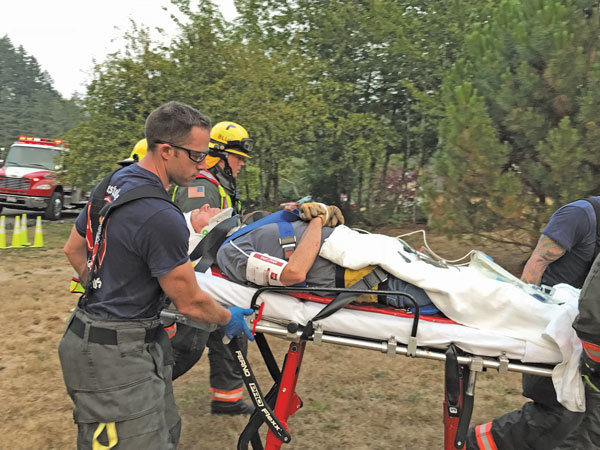 KPFD medics respond to a wide variety of medical emergencies. Photo: Anne Nesbit
KPFD medics respond to a wide variety of medical emergencies. Photo: Anne Nesbit
The state Legislature is on track to approve Senate Bill 6058, a Key Peninsula Fire District 16-inspired measure to change existing law granting it the authority to provide basic care and preventive medicine to anyone in the community.
State Sen. Emily Randall (D-26th, Bremerton) agreed to sponsor the bill and found four other co-sponsors.
SB 6058 provides authority to KPFD to operate its own health clinic, in whatever form that might take, funded by reimbursements from Medicare, Medicaid or private insurance. Only two other fire districts in the state are authorized to run their own clinics — South Kitsap and Point Roberts — and do so for similar reasons: issues of access to health care, difficulty attracting providers, and overlap between emergency medical services and hospitals.
“This simple expansion of health care access will meet our neighbors’ health care needs in a more efficient and affordable way,” Randall said. “I’m deeply grateful to Chief Morrow and KPFD for their willingness to go the extra mile — in providing care, rather than in emergency room trips — for our community.”
“If you look at our patient base, they are the same patients that the hospitals are working with to reduce their readmittance,” Morrow said. “They’re chronically ill, they need services beyond what they can provide directly and sometimes beyond what we can provide directly as an EMS provider. But they are the same people and they’re getting kind of lost in the system and it’s a terrible waste of the collective resources.”
KPFD responded to 2,407 incidents in 2019; of those, 1,472 were medical calls, Morrow said. “Within that number there’s somewhere between 28 and 40 percent that I know we could provide a slightly different level of service that would change their outcome, our expense, and the health care system expense at large.”
A KP fire department clinic could hire its own physician and nurses to work in its own facility or partner with an existing service to expand its reach, or even make house calls.
“Right now our only option is to take people to the hospital and that’s where the money just goes like crazy,” Morrow said. “But we could take those services into peoples’ homes, we could broaden our ability to provide additional transportation services to other medical facilities that might be more appropriate than an emergency room.”
Preventive medicine would be a big component of any outreach.
“Part of our job in the fire service is to prevent an emergency before it happens,” Morrow said. “This is the same concept in health care. If we can minimize slips that lead to falls, that lead to broken bones, head injuries, or make sure people aren’t missing or mixing up their meds, that makes sense for us. We can do post-discharge follow up; what’s the overall status — are there social issues, housing issues, medication issues, mental health issues — the total package.”
The Centers for Medicare & Medicaid Services, which reimburses providers for their work when applicable, is encouraging fire districts like the Key Peninsula to provide direct care to their populations.
“CMS has said they will reimburse us at a higher rate than what we currently get taking people to the ER,” Morrow said. “The problem is it’s a great plan, but we don’t have the authority. SB 6058 provides the authority for us to go do some of those things and honestly change the system for the better.”
The clinic idea is a byproduct of work Morrow performed in his former job as a deputy chief at Tualatin Valley Fire & Rescue in Oregon. “We did a lot of work with care organizations to try to deliver the services the hospital needed in our community. We found that we saved the hospital thousands and thousands of dollars, and they shared a portion of that savings with us,” he said. Their early intervention also freed up personnel and ambulances to respond to bona fide emergencies.
“What we have to be careful about is not utilizing the existing resources that are allocated to the fire district’s core services to fund a clinic in any fashion,” Morrow said. “There are several dividers in our concept that would allow us to share the resources but keep the revenue and expense streams separate, clear and transparent for the community.”
With the expected change in state law, the next thing on the list would be stakeholder engagement with the fire commissioners reaching out to the community to determine how to proceed without duplicating services, and identifying partners to expand existing services.
“I just know from personal experience and servicing the people here there’s a need we’re not filling,” Morrow said. “When I was thinking about coming to work here, everybody told me about this crazy wall at the Purdy Spit. I didn’t believe it, but unfortunately as I’ve been working here now for a year trying to get other services out to the Key Peninsula, the fact is that wall is alive, well and thick. I can’t get the services to come out here. So I just took what we were working on in Oregon and said, ‘We are the solution.’
“If we get the authority,” he said.
UPDATE: SB 6058 was approved by the state Senate Feb. 19 and the House on March 6. It still needs to be signed by Governor Jay Inslee to become law. The end of the legislative session is March 12.
UNDERWRITTEN BY THE FUND FOR NONPROFIT NEWS (NEWSMATCH) AT THE MIAMI FOUNDATION, THE ANGEL GUILD, ADVERTISERS, DONORS AND PEOPLE WHO SUPPORT INDEPENDENT, NONPROFIT LOCAL NEWS